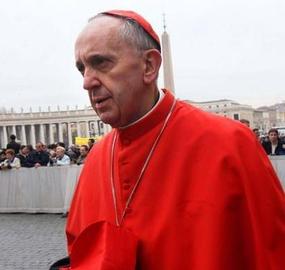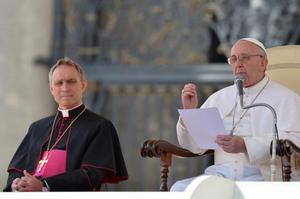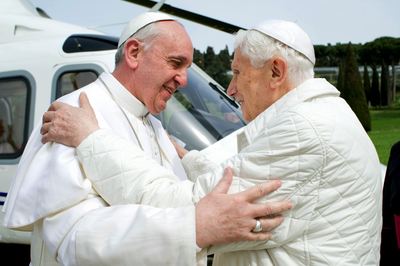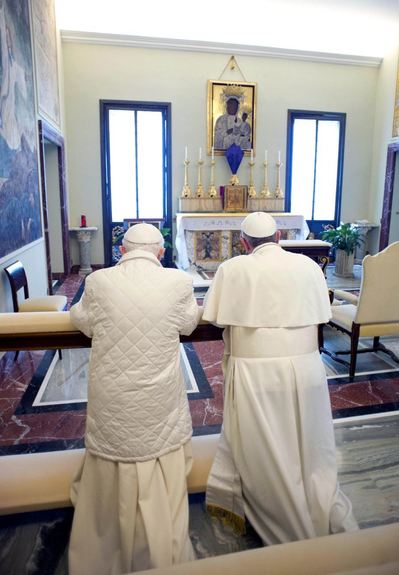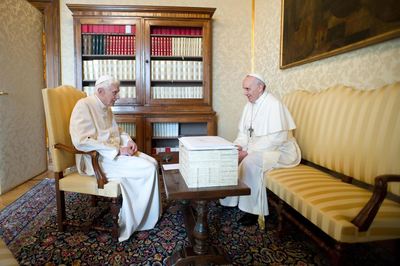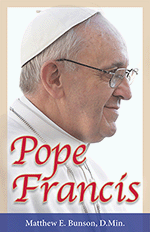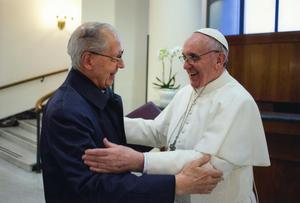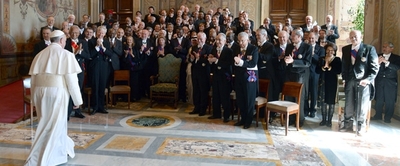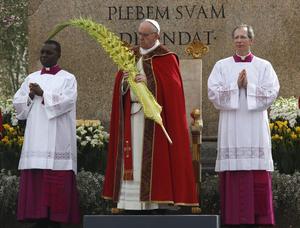
Pope Francis’ first celebration of the Holy Week liturgies. His homily for Palm Sunday follows:
1. Jesus enters Jerusalem. The crowd of disciples accompanies him in festive mood, their garments are stretched out before him, there is talk of the miracles he has accomplished, and loud praises are heard: “Blessed is the King who comes in the name of the Lord. Peace in heaven and glory in the highest!” (Lk 19:38).
Crowds, celebrating, praise, blessing, peace: joy fills the air. Jesus has awakened great hopes, especially in the hearts of the simple, the humble, the poor, the forgotten, those who do not matter in the eyes of the world. He understands human sufferings, he has shown the face of God’s mercy, he has bent down to heal body and soul. Now he enters the Holy City! This is Jesus.This is the heart that looks on all of us, watching our illnesses, our sins. The love of Jesus is great. He enters Jerusalem with this love and watches all of us.
It is a beautiful scene, the light of the love of Jesus, that light of his heart, joy, celebration.
At the beginning of Mass, we repeated all this. We waved our palms, our olive branches, we sang “Blessed is the King who comes in the name of the Lord” (Antiphon); we too welcomed Jesus; we too expressed our joy at accompanying him, at knowing him to be close, present in us and among us as a friend, a brother, and also as a King: that is, a shining beacon for our lives. Jesus is God, but he humbled himself to walk with us. He is our friend, our brother. Here, he enlightens us on the journey. And so today we welcome Him. And here the first word that comes to mind is “joy!” Do not be men and women of sadness: a Christian can never be sad! Never give way to discouragement! Ours is not a joy that comes from having many possessions, but from having encountered a Person: Jesus, from knowing that with him we are never alone, even at difficult moments, even when our life’s journey comes up against problems and obstacles that seem insurmountable, and there are so many of them! It is at this time that the enemy comes, the devil comes, often disguised as an angel who insidiously tells us his word. Do not listen to him! We follow Jesus!
We accompany, we follow Jesus, but above all we know that he accompanies us and carries us on his shoulders. This is our joy, this is the hope that we must bring to this world of ours. Let us bring the joy of the faith to everyone! Let us not be robbed of hope! Let us not be robbed of hope! The hope that Jesus gives us!
2. A second word: why does Jesus enter Jerusalem? Or better: how does Jesus enter Jerusalem? The crowds acclaim him as King. And he does not deny it, he does not tell them to be silent (cf. Lk 19:39-40). But what kind of a King is Jesus? Let us take a look at him: he is riding on a donkey, he is not accompanied by a court, he is not surrounded by an army as a symbol of power. He is received by humble people, simple folk, who sense that there is more to Jesus, who have the sense of faith that says, “This is the Savior.”
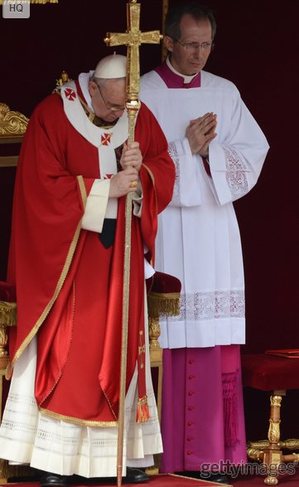
Jesus does not enter the Holy City to receive the honors reserved to earthly kings, to the powerful, to rulers; he enters to be scourged, insulted and abused, as Isaiah foretold in the First Reading (cf. Is 50:6). He enters to receive a crown of thorns, a staff, a purple robe: his kingship becomes an object of derision. He enters to climb Calvary, carrying his burden of wood. And this brings us to the second word: Cross. Jesus enters Jerusalem in order to die on the Cross. And it is here that his kingship shines forth in godly fashion: his royal throne is the wood of the Cross! I think of what Benedict XVI said to the cardinals: “You are princes but of a Crucified King” that is, Christ’s throne. Jesus takes it upon himself..why? Why the Cross? Jesus takes upon himself the evil, the filth, the sin of the world, including our own sin, and he cleanses it, he cleanses it with his blood, with the mercy and the love of God. Let us look around: how many wounds are inflicted upon humanity by evil! Wars, violence, economic conflicts that hit the weakest, greed for money, which no-one can bring with him. My grandmother would say to us children, no shroud has pockets! Greed for money, power, corruption, divisions, crimes against human life and against creation! And – each of us knows well – our personal sins: our failures in love and respect towards God, towards our neighbor and towards the whole of creation. Jesus on the Cross feels the whole weight of the evil, and with the force of God’s love he conquers it, he defeats it with his resurrection. This is the good that Christ brings to all of us from the Cross, his throne. Christ’s Cross embraced with love does not lead to sadness, but to joy! The joy of being saved and doing a little bit what he did that day of his death.
3. Today in this Square, there are many young people: for 28 years Palm Sunday has been World Youth Day! This is our third word: youth! Dear young people, I think of you celebrating around Jesus, waving your olive branches. I think of you crying out his name and expressing your joy at being with him! You have an important part in the celebration of faith! You bring us the joy of faith and you tell us that we must live the faith with a young heart, always, even at the age of seventy or eighty! A young heart! With Christ, the heart never grows old! Yet all of us, all of you know very well that the King whom we follow and who accompanies us is very special: he is a King who loves even to the Cross and who teaches us to serve and to love. And you are not ashamed of his Cross! On the contrary, you embrace it, because you have understood that it is in giving ourselves that we have true joy and that God has conquered evil through love. You carry the pilgrim Cross through all the Continents, along the highways of the world! You carry it in response to Jesus’ call: “Go, make disciples of all nations” (Mt 28:19), which is the theme of World Youth Day this year. You carry it so as to tell everyone that on the Cross Jesus knocked down the wall of enmity that divides people and nations, and he brought reconciliation and peace. Dear friends, I too am setting out on a journey with you, from today, in the footsteps of Blessed John Paul II and Benedict XVI. We are already close to the next stage of this great pilgrimage of Christ’s Cross. I look forward joyfully to next July in Rio de Janeiro! I will see you in that great city in Brazil! Prepare well – prepare spiritually above all – in your communities, so that our gathering in Rio may be a sign of faith for the whole world. Young people need to tell the world: “It is good to follow Jesus, it is good to go with Jesus, the message of Jesus is good, it is good to come out of ourselves, from the edges of existence of the world and to bring Jesus to others!”
Three words: Joy, Cross and Youth.
Let us ask the intercession of the Virgin Mary. She teaches us the joy of meeting Christ, the love with which we must look to the foot of the Cross, the enthusiasm of the young heart with which we must follow him during this Holy Week and throughout our lives. Amen.
